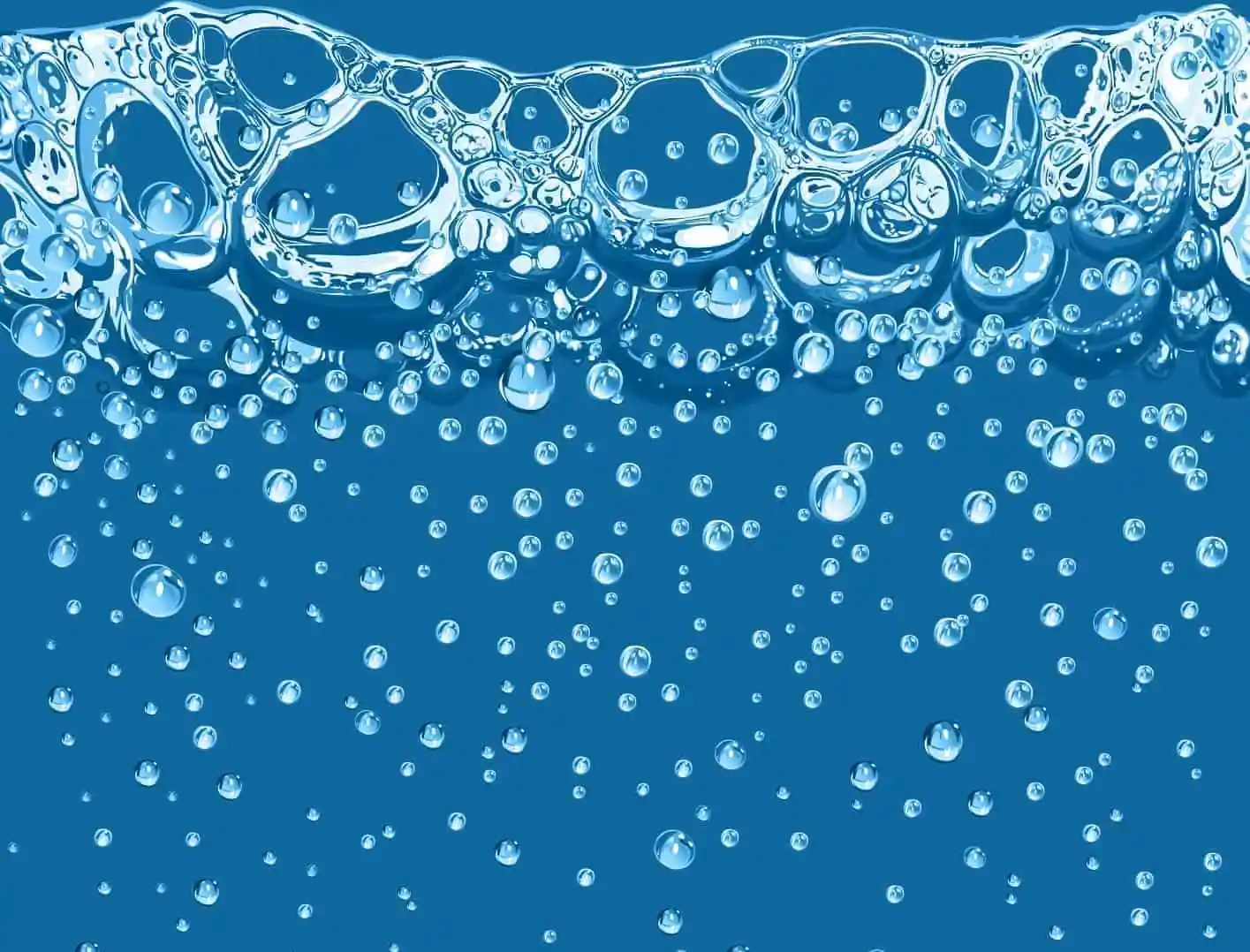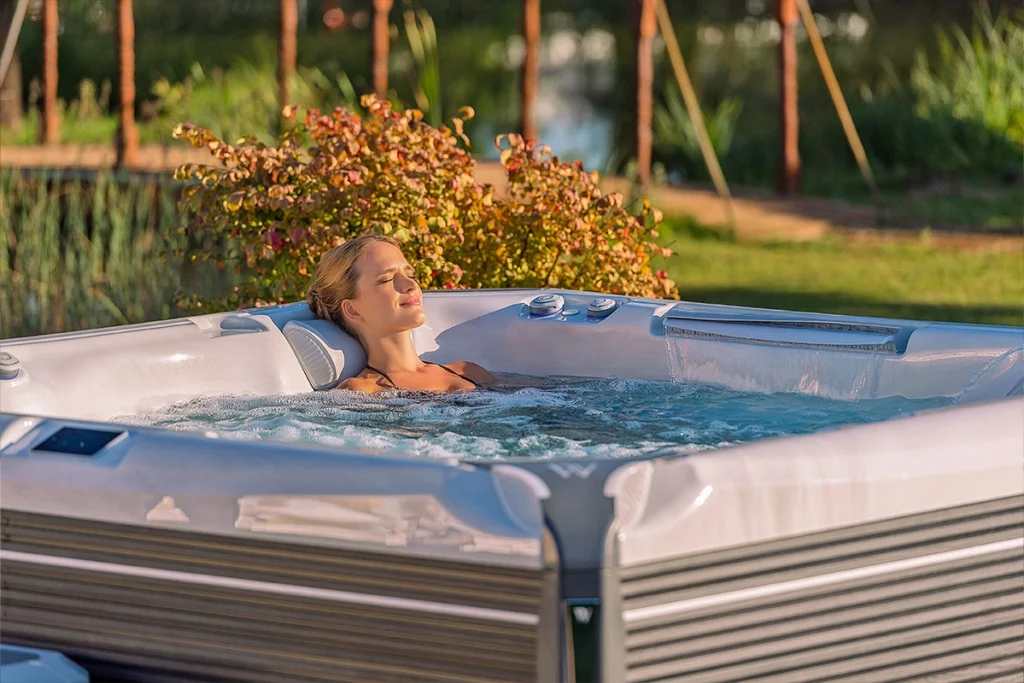In this article we dive into how an outdoor swim spa can add value to…

Are Hot Tubs Good for You? Exploring Health & Wellness
Discover if hot tubs are actually good for you with our guide. We’ll show you real medical evidence and give you some tips on how to get the best results.
Is boiling yourself like a frog in a hot tub actually good for you?
Sure, people talk about how hot water helps with health issues most of us have never heard of before, like “Left-Footed Vascular Hypertension.” But is there any evidence other than the generic, “Hot tubs soothe muscle aches, reduce muscle tension, and give you quality time with your family that doesn’t involve staring at a screen for hours until your eyeballs dry out?”
Right away, let’s say this: we are a hot tub dealer. We want you to buy a hot tub.
But we’re not evil geniuses trying to trick you into buying something that doesn’t actually have any benefit to you, your life, or your family.
So, let’s take a look at the real evidence about how hot water therapy and spas can actually help you.
Here’s what we’ll cover:
- Specific data about how hot tubs help manage health risks
- Advice on how to get the most out of the general benefits of hot tubs.
- Brief look at why people started using hot tubs for therapy
Interested in a real look at how a spa could help you? Let’s get into it.

The Medical and Scientific Benefits of Hot Tubs
Normal, healthy people can really enjoy the social and relaxing effects of hot tubs. They can be a great retreat from everyday life and a brilliant way to enjoy time alone or with friends and family.
But do hot tubs actually confer any medical benefit? We checked out numerous studies and this is what we found:
- Hot Tubs are great for people with Chronic Heart Failure (CHF). A study conducted on patients with CHF concluded that regular hydrotherapy resulted in an improved quality of life, blood pressure drops, and better blood circulation. Here’s a quick summary: “A home-based hydrotherapeutic thermal treatment program improves quality of life, heart-failure-related symptoms and heart rate response to exercise in patients with mild chronic heart failure.”
- Hot tub therapy is widely known to improve health & wellness. A study that analyzed 33 other studies (who has time for this??) brought all their results together. It reported a range of hot tub benefits on human health. Again, we quote: “The balance of high to moderate quality evidence supported benefit from hydrotherapy in pain, function, self-efficacy and affect, joint mobility, strength, and balance, particularly among older adults, subjects with rheumatic conditions and chronic low back pain.”
- Relieving chronic back pain is one of the major hot tub health benefits. Irina Todorov, MD, a physician writing for the Cleveland Clinic, pointed out how hot water is more beneficial than cold water for back pain. “When you have an injury like a sprain, it is recommended to use a cold compress because it causes the arteries to constrict and can decrease pain,” says Dr. Todorov. “But if we want something to heal like chronic back pain, you want a warm immersion because it causes muscle relaxation and can improve healing.”
We know there are a host of health benefits from using a hot tub. We’re not just trying to talk you into spending money to help our bank balance. If you’ve got persistent back pain, suffer from high blood pressure, or have chronic heart failure or cardiovascular disease, then a hot tub could be a genuinely helpful intervention for your health.
Hot Tub Benefits: More Than Just Bubbles
Alright, let’s set the scene here. I sell hot tubs, and while that might make you think I’m all about the sales pitch, this chat is different. We’re going to explore the real perks of hot tubs, beyond just kicking back and enjoying the bubbles. Trust me, it’s not just hot air – there’s some genuinely cool stuff your hot tub can do for you. Let’s take a dip into the details.
A Soothing Escape for Body and Mind
Hot tubs are not just for relaxation – they’re a cocktail of health benefits. The warm water works its magic in several ways, from easing you into a peaceful sleep to melting away the stresses of the day. Imagine the hot tub as your personal wellness sanctuary, where the heat helps to calm your mind and prep your body for a restful night.
Improving Physical Health: The Hot Tub Advantage
Think of your hot tub as more than just a spot for relaxation; it’s a health retreat right in your backyard. The mix of heat and buoyancy works wonders, offering a range of benefits that go beyond simple relaxation. Here’s a look at how regular soaks can boost your physical well-being:
- Relieves Joint Pain: The buoyancy of the water reduces the weight on your joints, easing pain and improving mobility.
- Reduces Muscle Tension: The warm water helps to relax tight muscles, providing relief from day-to-day stress and strain.
- Improves Blood Circulation: The heat from the hot tub helps to dilate blood vessels, enhancing overall circulation.
- Aids in Managing Chronic Conditions: Conditions like back pain or arthritis can benefit from the gentle, warming embrace of hot tub water, loosening stiff muscles and joints.
- Mini-Vacation for Your Body: Each soak is like a short, rejuvenating retreat, helping your body to reset and recharge.
Whether it’s unwinding after a tough day or seeking relief from chronic discomfort, a dip in the hot tub offers a variety of healthful perks.
A Mental Health Retreat
Let’s not forget the mental health perks. Hot tubs can be a refuge for your mental well-being, offering a space to unwind and reset. It’s like pressing a ‘pause’ button on life’s hustle and chaos, allowing you to find some much-needed mental peace. This can be particularly helpful for those dealing with stress and anxiety, as the soothing effect of the warm water provides a natural way to relax and rejuvenate.
Caution and Care in Hot Tub Use
Of course, hot tubs are not a universal solution. It’s important to approach them with caution, especially if you have certain health conditions or are taking specific medications. Pregnant women, for instance, need to be extra cautious, as high temperatures can affect the developing fetus. So, always consult with a healthcare professional before making hot tubbing a part of your routine.
Why Did People Start Using Hot Tubs?
Hot tubs are, maybe, more interesting than you think. What about these little-known facts?
Hot tubs go back at least as far as 15th Century Japan. The “Ofuro Bath” was heated with a woodburning stove and kept the water between 104-110 degrees. Hot!
Before the Japanese, Romans used heated baths as social places. But these were a bit more like large swimming pools and would have been in their own buildings.
The Modern Hot Tub by Jacuzzi
The modern hot tub was invented by Candido Jacuzzi. Nobody quite knows why Candido decided to stick an aeration pump into a bathtub. But when he did, he created the first hot tub water in the world. The Jacuzzi family helped develop this further with the addition of water jets and circulating pumps.
Inflatable Hot Tubs
After Jacuzzi and a few decades of hot tub marketing, a man named Tom Thornberry thought of a faster way to make money on tight muscles and chronic pain: inflatable hot tubs. These provide the same benefit as an in-ground spa, but cost less to install. Taking care of your budget is always good for your heart rate!
New Swim Spas Might be Even Better for You
Everyone knows regular exercise improves your health. We don’t need a clinical study to tell us moving around is better than lying on the sofa binging more episodes of Game of Thrones and drinking prosecco. A swim spa is like an overgrown hot tub. What can you use it for? Swimming, of course. But you could also do other things:
- Jump in for regular physical exercise programs. Check out Instagram for 6,954 exercise ideas from young influencers who haven’t hit the post-30 metabolism wall.
- Just walk against the current. Get into a daily routine of walking against the current. Add a few pounds in weight to your ankles to help keep you on the floor and challenge yourself.
- Swim with a goal in mind. Set up a training program for yourself with an idea like “I would swim 500 miles” by the Proclaimers. Maybe someone should turn that into a Peloton-like exercise video for swimmers…
Whatever you decide, some exercise in the swim spa followed by a session of muscle relaxation on the built-in bench seat will give you all the benefits and effects of exercise while also feeling relaxing and enjoyable.
In Conclusion
Hot tubs offer a unique combination of relaxation and health benefits. They’re like a personal oasis that can help improve both physical and mental well-being. Just remember to use them wisely and be aware of any personal health considerations. With the right approach, a hot tub can be a valuable addition to your wellness regimen, offering a delightful blend of relaxation and therapeutic benefits.
Ready for your next soak? Your hot tub is more than just bubbles; it’s a gateway to a healthier, happier you.

Intresting in getting a swim spa?
Call us at 888-884-3742 or fill out the form below to get in touch with a member or our team.
Manny Brambila
Manny has been in the Pool & Spa industry for over 15 years and is considered a pool, swim spa, & hot tub expert. He has been a Certified Pool & Spa Operator (CPO) since 2009 and worked 15 years in aquatic training and development for the largest pool chemical and customer care company. He also has been an outside consultant for the Pool and Spa industry in Chicago, New York and Los Angeles since 2018. In the past few years Manny has become Director of Operations for Epic Hot Tubs with a priority of providing customers with the most reliable information and best service possible.


